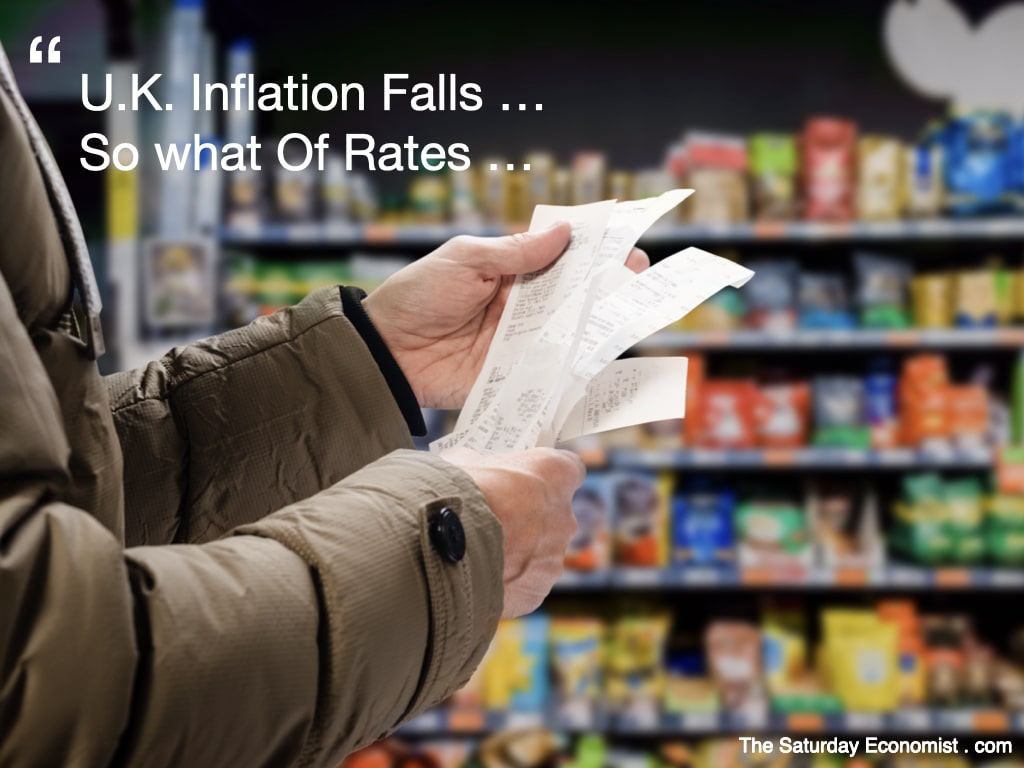|
"Proof The Plan Is Working" ...
Mixed news for policy makers in the inflation data this week. Inflation CPI basis eased to 2.3% in April, down from 3.2% in March and well below the peak for this cycle of 11.1% in October 2022. Rishi Sunak said: "Today marks a major moment for the economy, with inflation back to normal. This is proof that the plan is working. The difficult decisions we have taken are paying off." He could have added ... "From here it could get worse, one of the main reasons I made the election call, I'm off". Markets were disappointed. Analysts had expected a drop to 2.1%, closer to the Bank of England target of 2.0%. Disappointed but not unduly troubled. Ten year bond yields increased by 12 basis points, closing at 4.25. Sterling ended the week unchanged at $1.27. Further analysis of inflation data, would only cause "further" disappointment. Goods inflation, fell to -0.8%. The goods figure was flattered by a further fall in energy costs. Ofgem lowered the cap on average annual household energy bills by 12 per cent in the month, leading to a fall in energy costs of minus 27%. Service sector inflation eased to just 5.9% from 6.0% prior month. Insurance, health care, restaurants and hotels prices were particularly high. Treasure that no claims bonus, transport insurance costs were up by 24%. Underlying inflation excluding energy, food and booze, eased to 3.9%. The arithmetic mean CPI number for the month was 2.5%, significantly above the Bank's 2.0% target. Grant Fitzner, chief economist at the ONS, said: "There was another large fall in annual inflation led by lower electricity and gas prices." Read "Prices are falling gangbusters." "Tobacco prices also pull down the rate, with no duty changes announced in the budget. Food price inflation saw further falls over the year." [The rate of food inflation eased to 2.8%.] Manufacturing output prices increased by 1.1% in April, up from an average 0.3% in the first quarter. Manufacturing input costs were lower by -1.6% in April, compared to -2.7% in the first three months of the year. Still no retail price pressure but evidence of a turning point perhaps. Oil prices Brent Crude averaged $89.90 dollars in April this year, compared to $84.60 dollars last year. A plus 6% inflation impact Sterling adjusted. Money Supply M4, for some a leading indicator of inflation, bottomed out in September and October last year, with the latest data in March completing a reverse head and shoulders formation. The pattern suggests prices are set to rise towards the end of this year, in line with the Bank's own expectations. CPI inflation is expected to end the year at around 2.5%. So What of Rates ? The Bank of England will be concerned by the stubborn performance in service sector inflation, sticky earnings data and the moderate drop in underlying inflation. According to The Times, Tomasz Wieladek, chief European economist at T Rowe Price, said: "Although there is some evidence that services inflation is falling gradually, the data today will likely prevent a cut in June." Paul Dales, chief UK economist at Capital Economics, said: "It feels as though a cut in June now seems very unlikely. Even a cut in August is looking a bit more doubtful." The IMF this week suggested three rate cuts are possible in the UK this year. As we said last week, June [22nd] may just be a bit too soon. No meeting in July, the next MPC meeting after that, is the 3rd August.
0 Comments
Leave a Reply. |
The Saturday EconomistAuthorJohn Ashcroft publishes the Saturday Economist. Join the mailing list for updates on the UK and World Economy. Archives
July 2024
Categories
All
|
| The Saturday Economist |
The material is based upon information which we consider to be reliable but we do not represent that it is accurate or complete and it should not be relied upon as such. We accept no liability for errors, or omissions of opinion or fact. In particular, no reliance should be placed on the comments on trends in financial markets. The presentation should not be construed as the giving of investment advice.
|
The Saturday Economist, weekly updates on the UK economy.
Sign Up Now! Stay Up To Date! | Privacy Policy | Terms and Conditions | |

 RSS Feed
RSS Feed